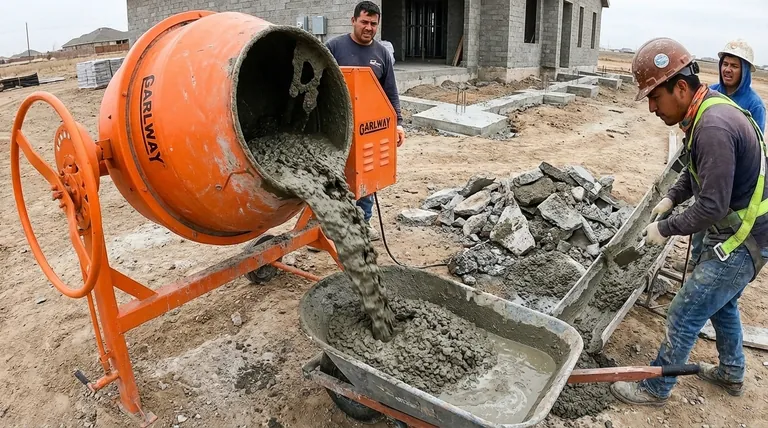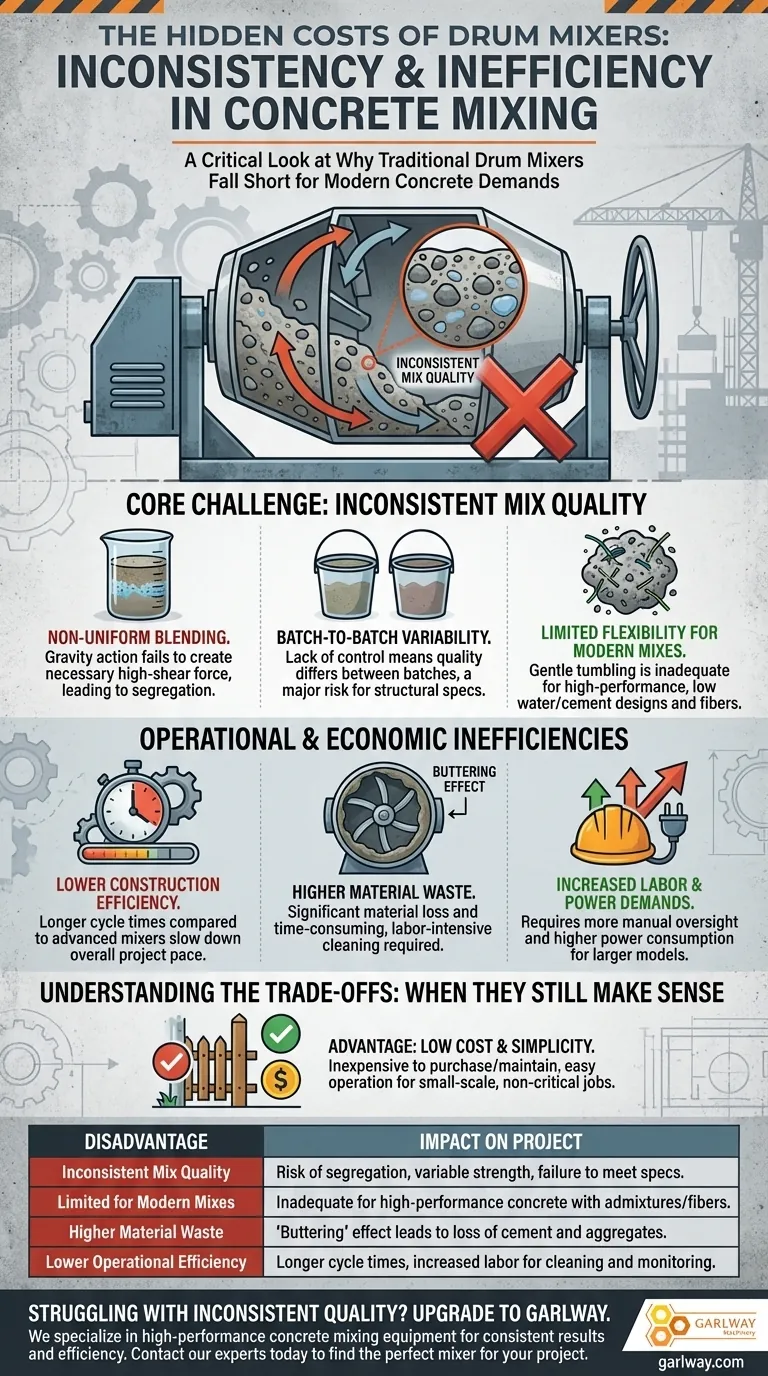The primary disadvantages of drum mixers are inconsistent mix quality, lower operational efficiency, and a lack of suitability for modern, high-performance concrete designs. While common and affordable, their simple tumbling action fails to provide the high-shear force needed for truly uniform and reliable concrete.
The core issue with drum mixers is a fundamental trade-off: their simplicity and low cost come at the expense of control. For any project where concrete quality, strength, and consistency are critical, this lack of control becomes a significant liability.

The Core Challenge: Inconsistent Mix Quality
The most critical drawback of a drum mixer stems from its basic mechanical action. The simple lifting and dropping of materials is often insufficient to produce truly homogeneous concrete.
The Problem of Non-Uniform Blending
A drum mixer primarily relies on gravity. As the drum rotates, fins lift the material, which then tumbles back down. This action can fail to create the high-shear force necessary to evenly coat every particle of aggregate with cement paste.
This leads to segregation, where heavier aggregates can separate from the finer components, resulting in a non-uniform mixture throughout the batch.
Batch-to-Batch Variability
Because the mixing action is not perfectly controlled, the quality can differ from one batch to the next. One batch might have a slightly different slump or water distribution than another, even with identical inputs.
This inconsistency is a major risk for structural applications where every pour must meet precise engineering specifications.
Limited Flexibility for Modern Mixes
Modern concrete often includes special admixtures, fibers, or uses very low water-to-cement ratios. These designs require intense, high-energy mixing to properly disperse additives and ensure full hydration.
A drum mixer's gentle tumbling action is often inadequate for these sophisticated, high-performance mixes.
Operational and Economic Inefficiencies
Beyond mix quality, drum mixers introduce practical inefficiencies that impact a project's budget and timeline.
Lower Construction Efficiency
Achieving an acceptable mix in a drum mixer can take longer compared to more advanced mixers like pan or twin-shaft types. This extends cycle times and can slow down the overall pace of a construction project.
Higher Material Waste
The design of a drum mixer often leads to a "buttering" effect, where a layer of cement paste and fine aggregate sticks to the inside of the drum and its fins.
This not only represents a loss of raw material with every batch but also necessitates time-consuming and labor-intensive cleaning.
Increased Labor and Power Demands
Drum mixers typically require more manual oversight for loading and monitoring to ensure a passable mix. When combined with the demanding cleaning process, the overall personnel input is high.
Furthermore, larger models can have significant power consumption, adding to the operational costs of the job site.
Understanding the Trade-offs: When Drum Mixers Still Make Sense
Despite their significant drawbacks, drum mixers remain prevalent for a reason. Their disadvantages must be weighed against their specific advantages in the right context.
Advantage: Low Cost and Simplicity
Drum mixers are mechanically simple, making them relatively inexpensive to purchase and maintain. Their straightforward operation requires minimal specialized training.
Advantage: Adaptability for Small Jobs
For small-scale, non-structural applications—like setting fence posts, pouring a small slab, or minor repair work—a drum mixer is often the perfect tool.
In these scenarios, absolute batch-to-batch consistency and high performance are less critical than convenience and low cost.
Making the Right Choice for Your Project
Choosing the correct mixer requires aligning the equipment's capabilities with the specific demands of your concrete work.
- If your primary focus is high-performance, structural concrete: The quality and consistency risks associated with drum mixers make them an unsuitable choice.
- If your primary focus is efficiency on a large-scale project: The slower cycle times, material waste, and higher labor input make drum mixers economically inefficient compared to alternatives.
- If your primary focus is small-scale repairs or non-critical applications: The low initial investment and simplicity of a drum mixer make it a practical and cost-effective solution.
Ultimately, selecting the right mixer is about matching the tool's precision to the project's quality requirements.
Summary Table:
| Disadvantage | Impact on Project |
|---|---|
| Inconsistent Mix Quality | Risk of segregation, variable strength, and failure to meet specifications. |
| Limited for Modern Mixes | Inadequate for high-performance concrete with admixtures or fibers. |
| Higher Material Waste | 'Buttering' effect leads to loss of cement and aggregates. |
| Lower Operational Efficiency | Longer cycle times and increased labor for cleaning and monitoring. |
Struggling with inconsistent concrete quality and project delays from your current mixer? Upgrade to a reliable solution from GARLWAY. We specialize in high-performance concrete mixing equipment, including durable concrete mixers and batching plants designed for construction companies and contractors who demand consistent results, efficiency, and less waste on every job. Contact our experts today to find the perfect mixer for your project's needs and ensure superior concrete quality.
Visual Guide

Related Products
- Concrete Cement Mixer Machine Drum Mixer for Construction
- Ready Mixer Machine for Construction Ready Mix Machinery
- HZS35 Small Cement Concrete Mixing Batch Plant
- HZS180 Ready Mix Concrete Plant for Foundations with Sand and Cement
- HZS75 Concrete Batching Plant Cement Mixer Price Concrete Mixer Bunnings Mixing Plant
People Also Ask
- How can material buildup or adhesion in a self-loading concrete mixer be prevented? Essential Strategies for Efficiency
- What safety features are included in modern concrete mixer trucks? Essential Systems for Jobsite Safety
- How is water management handled in these mixers? Achieve Precise Water-to-Cement Ratios for Superior Concrete
- What is the average lifespan of a concrete mixer? Maximize Your Equipment's Lifespan & ROI
- What factors to consider when selecting concrete mixer? Find the Perfect Match for Your Project
- What is the typical capacity range for mortar mixers? Ideal for Precision Masonry Work
- What are the advantages of buying a concrete mixer? Save Costs & Boost Efficiency on Your Projects
- What is the key difference between batch mixers and continuous mixers? Precision vs. Volume



















